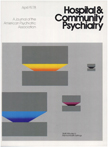Primary Prevention of Child Abuse: Focus on the Special Child
Abstract
The authors review the literature on child abuse and present evidence demonstrating that children who are born prematurely or who are sickly or handicapped are at high risk for child abuse. The authors describe ways to identify such children and suggest a number of primary prevention techniques that can reduce parental stress and help prevent child abuse. The techniques include day-care programs for handicapped children, mothers' social clubs, and lay health visitors to give support and impart proper maternal attitudes.
Access content
To read the fulltext, please use one of the options below to sign in or purchase access.- Personal login
- Institutional Login
- Sign in via OpenAthens
- Register for access
-
Please login/register if you wish to pair your device and check access availability.
Not a subscriber?
PsychiatryOnline subscription options offer access to the DSM-5 library, books, journals, CME, and patient resources. This all-in-one virtual library provides psychiatrists and mental health professionals with key resources for diagnosis, treatment, research, and professional development.
Need more help? PsychiatryOnline Customer Service may be reached by emailing [email protected] or by calling 800-368-5777 (in the U.S.) or 703-907-7322 (outside the U.S.).



